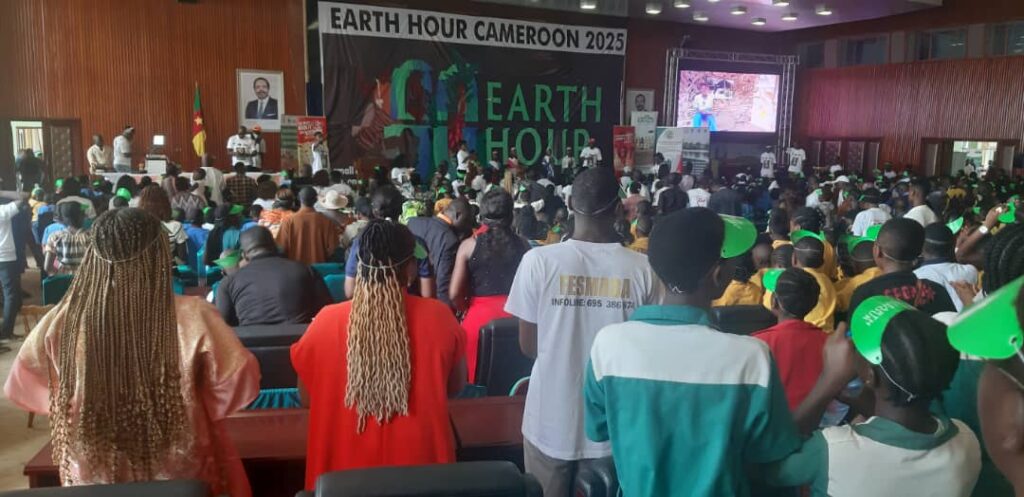By Leocadia Bongben
Yaoundé, the city of seven hills, came alive on Saturday as thousands of Cameroonian youth joined 180 other countries to commemorate Earth Hour.
WWF organized the event in partnership with Carton Rouge, a children’s program that brought together pupils, students, and guardians to show love to the earth through songs, dance, and messages as their way of dedicating an hour to do something for the planet. On the occasion, participants reiterated their commitment to protect and preserve the environment for future generations.
To the WWF representative, Nicole Bisong Nkwapai, “This is more than a moment. It’s a movement. An opportunity to raise awareness about biodiversity loss and food waste and encourage young people to take meaningful action for a healthier planet.”
Earth Hour 2025 was commemorated under the theme, “Let’s Create the Biggest Hour for the Earth.” The event followed a week-long campaign involving over 10,000 youths in schools across Yaoundé. The initiative strives to empower the next generation to protect nature and drive change in their communities through symbolic actions such as tree planting, educative talks, and other awareness-raising activities.
Since its beginning in 2007, Earth Hour has been known for its famous “lights off” moment. However, in Africa, the movement has moved beyond symbolic, pushing communities to take real, practical action for nature by ‘giving’ one hour to the Earth through any activity, such as planting trees, exercising in nature, or educating students about environmental preservation. In 2024, supporters across the continent contributed 171,531 hours to the planet, adding to the global total of nearly 1 million aggregate hours, with Earth Hour driving conservation projects, renewable energy access, and community-led initiatives.
Earth Hour was observed at a time when the globe navigated significant policy moments such as the Climate COP, CBD COP, and INC negotiations on plastics. WWF values global commitments that result in meaningful, measurable conservation impact. Earth Hour is a one-of-a-kind tool for public mobilization that connects policy conversations with grassroots action.

Ahead of the day, a conversation with experts on the Earth Hour webinar brought together the media, WWF policy experts, conservation leaders, and key partners to strengthen advocacy and communication, enhance stakeholder engagement, and inspire collective action.
Lisa Karanja, WWF Regional Director, East and Southern Africa, highlighted the importance of Earth Hour 2025 and its global impact, tracing the historical context and its evolution into a grassroots environmental movement. She said Earth Hour has impacted various African countries, including Madagascar, Tanzania, South Africa, and Uganda. She emphasized the twin crises of climate change and nature loss, citing the Living Planet Report and recent extreme weather events. Karanja called for public mobilization and global policy action, urging the media to hold decision-makers accountable.
“Africa has been at the heart of Earth Hour’s momentum. All 54 countries in our region have participated in Earth Hour in the past, adapting it to local needs, from restoring degraded landscapes to ensuring access to clean energy and advocating for stronger policies. Earth Hour is about connecting people with real solutions and creating a movement that delivers lasting impact,” Karanja stated.
Durrel Halleson, Manager, Policy & Partnerships, Africa at WWF Regional Office for Africa, emphasized the need for increased climate finance, noting a $200 billion commitment at COP 29, and the importance of climate finance for Africa, noting that the commitment from developed countries is a step up from previous commitments, highlighting the final operationalization of the fund for loss and damage, crucial for Africa, besides the support program for implementing national adaptation plans for least-developed countries. Halleson expressed hope for strong commitments at COP 30 in Berlin and COP 32 in Africa, emphasizing the need for rapid emission reduction and fossil fuel phase-out.
Earth Hour was held on March 22nd, coinciding with World Water Day, to emphasize the critical need to maintain and restore the planet’s freshwater systems. With one in every three people in Sub-Saharan Africa experiencing water scarcity and climate change exacerbating floods, droughts, and water insecurity, this worldwide reflection provides an opportunity to raise calls for sustainable water management and conservation. WWF advised people to commit an hour to Earth and equally take action for freshwater by reducing water waste, supporting conservation projects, and advocating for policies that preserve rivers, lakes, and wetlands.
Caroline Mwebaze, a hydrologist from Uganda, underlined the issue of water scarcity in Africa, having only 9% of the world’s freshwater resources. She emphasized the importance of integrated water resource and catchment management, the loss in per capita water availability, and the impact of climate change on water resources. She advocated for climate-resilient infrastructure, water efficiency, and the implementation of climate change initiatives while emphasizing the significance of economic incentives and increased monitoring to support sustainable water management.
Mweene Chaambwa discussed the Global Biodiversity Framework, noting only 49 out of 196 countries have revised their national biodiversity strategies. Kyategeka Ritah highlighted the failure to reach a legally binding treaty on plastic pollution at COP 27.
“The real challenge is not about making commitments but ensuring they lead to meaningful, lasting impact. Earth Hour is more than a symbolic moment; it is a global movement that connects policy discussions with grassroots mobilization. We need stronger advocacy communication, deeper stakeholder engagement, and greater public participation to drive real change in climate action, biodiversity protection, and plastic pollution,” said Martin Kabaluapa Kapinga, WWF Regional Director, Congo Basin.

